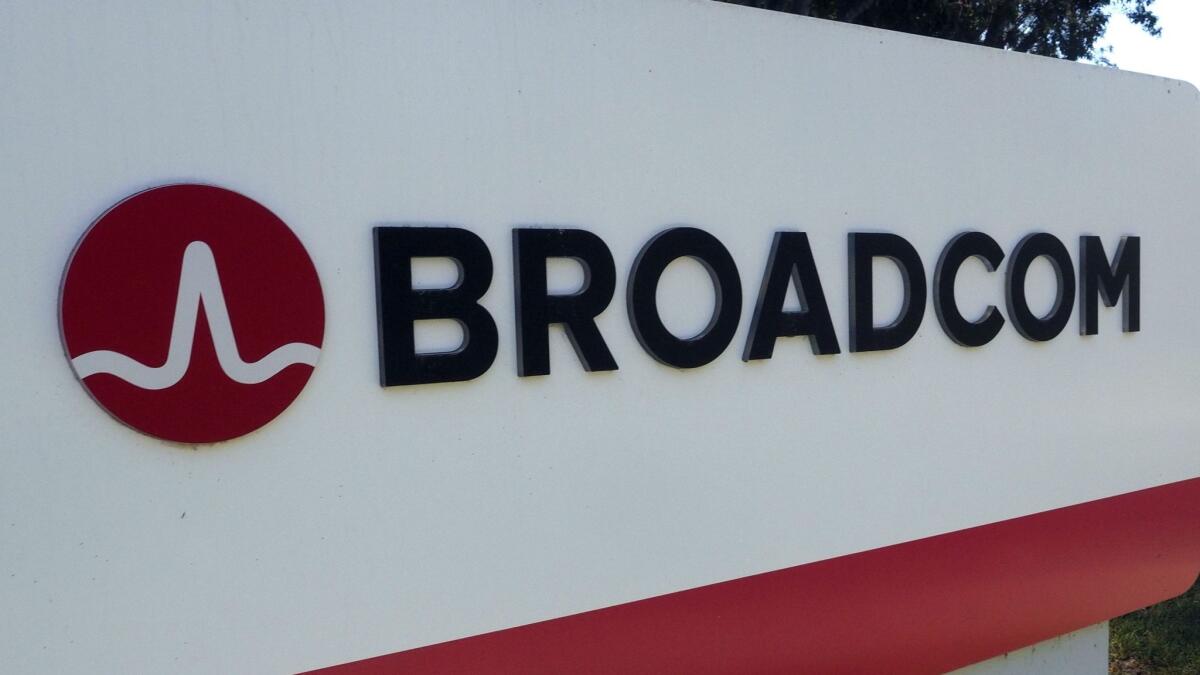Trump blocks Broadcom from buying Qualcomm, citing national security

- Share via
In the latest example of his tough stance against foreign takeovers of U.S. technology companies, President Trump on Monday blocked Broadcom Ltd. from acquiring Qualcomm Inc., scuttling the proposed $117-billion deal on national security grounds.
The president issued the executive order on a recommendation by the Committee on Foreign Investment in the United States, which reviews acquisitions of American firms by foreign investors. The decision to block the deal was unveiled hours after Broadcom Chief Executive Hock Tan met with security officials at the Pentagon in a last-ditch effort to salvage the transaction.
“There is credible evidence that leads me to believe that Broadcom Ltd.” by acquiring San Diego-based Qualcomm “might take action that threatens to impair the national security of the United States,” Trump said in the executive order.
Trump’s order came after an investigation by CFIUS, which had said the proposed acquisition by Singapore-based Broadcom would undermine Qualcomm’s leadership in so-called 5G wireless technology, opening the door for China’s Huawei Technologies Co. to become dominant.
Qualcomm and a host of other big technology companies are racing to build a 5G, next-generation nationwide network with download speeds that could be 100 times faster than what most consumers experience now on their wireless service. Once deployed, a high-definition movie could load instantly on a smartphone. The capabilities of connected devices at work and home would vastly expand. Cable-quality service could even be provided over the air, instead of a wireline connected to a house.
In September, Trump blocked the sale of Lattice Semiconductor Corp. to a Chinese-backed investor. That was just the fourth time in a quarter century that a U.S. president stopped a foreign takeover of an American firm on national security grounds. At least half a dozen technology deals have collapsed during the Trump administration in the face of concerns raised by CFIUS.
The Treasury Department, which leads CFIUS, had said the Qualcomm deal raised red flags because it threatened Qualcomm’s leadership in developing the next generation of wireless technology. The government said it feared Broadcom would cut investment in research and development to increase short-term profits. That could enable Chinese companies to become the dominant supplier, the U.S. said.
Trump’s order came as Broadcom was in the midst of moving its headquarters from Singapore to the U.S. It was seeking to gain majority control of Qualcomm’s board to advance its hostile takeover. CFIUS ordered the shareholder vote be postponed to investigate the transaction.
Broadcom recently moved to speed up the relocation of its corporate headquarters — a move that Trump himself announced last November in a meeting at the White House with Tan, the company’s CEO. The move raised questions about whether CFIUS even had jurisdiction to investigate a Broadcom-Qualcomm deal. But in speeding it up, Broadcom violated terms of an order by CFIUS, the regulator said.
Broadcom’s headquarters relocation was originally scheduled to be completed by May 6. But after CFIUS began an investigation of the hostile takeover effort, Broadcom began efforts to speed up the relocation to April 3 — two days before Qualcomm shareholders were to vote on whether to hand control to Broadcom by putting Broadcom-backed candidates on Qualcomm’s board of directors.
In a letter to both companies dated Sunday, CFIUS accused Broadcom of failing on three separate occasions to provide five business days’ notice of its efforts to accelerate the headquarters relocation. Qualcomm filed a copy of the letter with the U.S. Securities and Exchange Commission on Monday morning.
Broadcom’s Tan met Monday with CFIUS officials to make his case that his company should be allowed to pursue an acquisition of Qualcomm. But those talks apparently failed to change the regulator’s stance.
In regular trading Monday, Broadcom shares jumped 3.6% to $262.84 after reports late Friday that rival Intel Corp. might try to acquire Broadcom if the Qualcomm deal seemed likely to go through. Intel shares fell 1.3% to $51.52. Qualcomm shares edged down 0.3% to $62.81.
In after-hours trading, after Trump issued his order, Qualcomm shares sank more than 4%, and Broadcom and Intel shares each rose more than 1%.
San Diego Union-Tribune staff writer Mike Freeman and the Washington Post contributed to this report.
UPDATES:
4:50 p.m.: This article was updated with additional background information and with stock prices.
3:55 p.m.: This article was updated with President Trump blocking the deal.
This article was originally published at 10:35 a.m.






